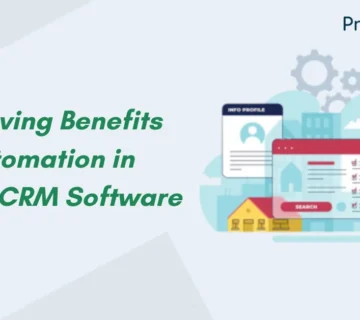Making prompt, informed judgments can provide firms with a competitive edge in the real estate market of today. Using data analytics in a Property CRM (Customer Relationship Management) system is one of the finest ways to accomplish this. You may manage leads, comprehend your market, and eventually make smarter judgments to increase sales with the aid of a property CRM equipped with data analytics tools.
Understanding Data Analytics in Property CRM
Actually, data analytics is that process of analyzing large amounts of data to find trends, patterns, and otherwise insightful information. Thus, a property CRM powered by data analytics enables you to track and analyze everything from market trends to customer behavior, property performance, and much more. All the information you collect finds meaning in your hands so that you can apply it to make your strategy better. With data analytics, you get to make judgments based on hard facts and not speculations.
How Data Analytics Changes Lead Management
Lead management is amongst the most important tasks of any real estate firm. Data analytics can make this much more feasible. Every single time you connect with a prospecting buyer, seller, or tenant, your CRM is adding to its data set. Examples include what they are interested in, what types of homes they look at, and how often they do interact with your listings.
Data analytics could be used in determining leads that may convert into sales. The various leads will not have an opportunity to keep you busy, saves time, and chances of an agreement going through are heightened by focusing your attention on the most important leads. For instance, if data indicates that a client favours properties in a particular location, you can offer them more options from that location. Customers tend to believe in your services and understand when you adopt a personalized methodology.
Monitoring Market Trends
There are many reasons for property markets that change seasonally or for other economic fluctuations. This kind of information can be tracked through data analytics in real time. Market data analysis will inform you about the updated information on the current status of pricing in real estate, the location that becomes most desirable, and trends which would eventually emerge.
Appreciating these trends can help you modify your approach to fit the state of the market
For example, you will spend a lot more hours marketing rental houses in a certain area if data is showing that people want an increasing number of houses. And thereby, by predicting what shall come next, you’re out of the box ahead of the curve rather than just chasing the market.
Customers Relationships
Now, data analytics is a prerequisite for building better customer relationships. Customer data analysis generally allows you to infer their preferences and needs. Based on this knowledge, it becomes straightforward for you to personalize your relationship with customers in such a way that they feel valued and appreciated.
For example, if you realized that your client frequently inquires about family homes, you would send them updates as soon as this type of property comes up. This is the kind of customized service that will serve to create a happy experience and loyalty from the customers, which would be vital for long-term success.
Measuring Success and Setting Goals
Data analytics in your Property CRM lets you accurately measure your success and set realistic goals for your team. Analytics can give answers to several performance indicators by informing the numbers of closed deals, responses by time, and customer satisfaction levels. The minute you get to understand those metrics, it gives you a visual representation of what’s working well and what areas need attention.
This becomes a straightforward way of setting clear, data driven goals as you move with analytics. Supposing your CRM is showing that most deals would close within two weeks of the first viewing of the property; you can then set a goal to reduce that even further. Therefore, this encourages the respective team members to be focused on measurable goals that lead them to their business objectives.
Making Smarter Marketing Decisions
For example, a property CRM would provide you with data analytics – which would help you fine-tune your marketing strategy. You’ll be able to figure out which channels – social, email, or maybe even calls directly are working best and invest in them. In this way, you will spend less money on channels that won’t bring the most bang for your buck and invest more where it’s going to bring the best results.
For instance, you would pay more attention to digital marketing if your statistics indicated that most leads came from online listings. Another example would be changing or replacing an underperforming campaign in order to cut costs. This focused approach attracted better prospects and had a greater return on investment.
Last Note
You’ll be transforming your business by making your decision-making process much more informed and effective with data analytics in your Property CRM. You will make better decisions that increase sales, improve customer relationships, and spur growth, taking into consideration the information about lead behaviour, market trends, customer preferences, and even team performance. Data analytics goes beyond gathering statistics to putting those statistics to use in building a stronger and more prosperous real estate company.
 +971 457 13703
+971 457 13703






No comment